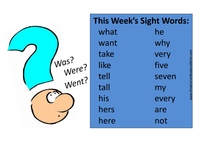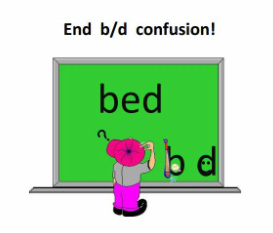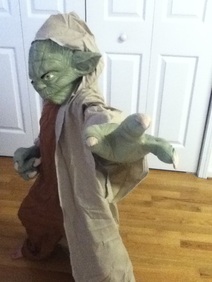
1. Check to see if your child can read the text he or she is trying to comprehend fluently and accurately. To comprehend anything well, your child must first be able to read it. If your child is having to work extremely hard just to figure out what the text at hand says, he or she will probably not be able to comprehend it very well. Likewise, if he or she is able to read most of the text but is MISCALLING a lot of important words while doing so, his or her comprehension is likely to suffer as well. After all, miscalling even a few crucial words can drastically change the meaning of the text being read. Failure to stop at periods and/or pause at commas can also mess with your child's ability to comprehend the text at hand.
What you can do: Have your child read the passage he or she is having difficulty comprehending OUT LOUD to you. Listen carefully to see if he or she is struggling to read the words, miscalling words, and/or flying through punctuation marks. If necessary, help correct any of these errors. If you don't feel comfortable helping your child with the mechanics of learning to read, consider hiring a good reading tutor. Since vision and/or convergence issues can play a part in many reading issues, especially with regard to miscalling similar-looking words and/or flying through punctuation marks, you might also consider getting your child's eyes checked. In any case, your child MUST be able to read accurately and fluently to get the most out of whatever text is in front of him or her.
2. Check to see if your child has any vocabulary, language, and/or processing issues. Kids who can read all of the words on a page correctly but who don’t understand what they are reading as they go through the passage at hand often sneak under the “trouble with reading radar" because everything "sounds good" when they read. Unfortunately, "sounding good" is not the same thing as comprehending well. Oftentimes, this is due to underlying vocabulary, language, and/or processing issues.
What you can do: Pull out a few key words from the passage and see if your child can define them and/or use them in a sentence. If he or she has trouble, vocabulary issues could be to blame. Don't forget to ask about peculiar phrases as well, such as “burning with anger” or “cracking up.” Some kids read these quite literally and get an entirely different picture of what is going on in the passage as a result! If your child has trouble understanding words and/or phrases, begin working to improve his or her vocabulary, language, and background knowledge. Talk, talk, talk to your child about EVERYTHING! Explain any weird phrases that pop up. Don’t forget to READ new stories and/or passages to your child daily as well! A good vocabulary, an adequate grasp of the language, and a decent amount of background knowledge on a variety of topics are all crucial to understanding text of all sorts.
If your child has a clear understanding of what various words and phrases mean but still has trouble comprehending the text at hand, he or she may have a processing issue. See what you can do to help your child use his or her strengths to overcome whatever processing issue is at hand. For instance, some kids can't comprehend text read aloud; let these kids read silently before asking them to answer any questions. Other kids MUST read aloud to comprehend what they are reading; let them do so. Help your child figure out when he or she comprehends best and encourage him or her to do more of whatever seems to help him or her the most!
3. Check to see if your child has short-term and/or working memory issues. Kids with dyslexic tendencies and other learning difficulties often have short-term and/or working memory issues. This can affect their ability to recall what was read. Even though they might read the sentences at hand beautifully, kids with short-term and/or working memory issues may quickly forget each sentence read as they move on to the next. Obviously, this can greatly limit a child’s ability to answer questions about the text read when they finally get to the end of a story or passage. The longer the story or passage, the harder it is for someone with short-term and/or working memory issues to remember and/or comprehend what was read.
What you can do: After a sentence or two, ask your child if he or she can remember what he or she just read. Kids with memory issues will often have to look back at the previous sentences to remember. In many cases, they’ll simply read back the sentences verbatim to answer your question. If this is the case, try covering up the sentences previously read the next time you ask. See if your child can recall anything when he or she can't look back at the words. If your child looks at you blankly and/or can’t remember what he or she just read about, encourage him or her to begin making "mental movies" as he or she reads each sentence. Sometimes the mental visual is enough to help kids remember what they are reading about so they can absorb the information better. Other times, kids need a more concrete reminder. If this is the case for your child, allow him or her to draw a little picture in the margin (or on a separate piece of paper) to represent the main idea of whatever happened or was discussed in each paragraph. In either case, remind your child that it’s okay to look back at the passage read when answering comprehension questions, but that he or she needs to TRY to remember as much as possible while reading the text. With this said, encourage your child to look back through the text whenever he or she simply can’t remember something – a date, a name, a place, etc. Guessing is generally NOT a good idea for kids with memory issues!
4. Check to see if your child is paying attention and/or racing through the passage. Kids with attention issues who struggle with comprehension might read the passage beautifully but “tune out” and/or think of other things while they are reading. Others (with or without attention issues), might simply race through whatever they are reading, forgetting to soak up all the details while they do so. For many of these readers, the goal seems to be more about simply getting through the passage than understanding and/or learning from it.
What you can do: Listen to your child read. If he or she is rushing through the text, slow him or her down. Make sure he or she is stopping at periods and other ending marks, as well as pausing at commas, dashes, and semi-colons. Remind your child that someone is trying to tell him or her about something and that he or she needs to pay attention while reading in order to understand the message and/or story being told. Encourage your child to make a mental movie of the story while reading to help him or her keep his or her full attention on the text at hand. Ask questions afterward to ensure he or she paid attention and understood the story and/or text read. Have your child reread the text if necessary. Let him or her know that it is important to go back and reread text if he or she finds he or she no longer knows what is going on in the story. Remind your child that it's not just about getting to the end of the passage; he or she needs to actually know what the passage was about when he or she gets to the end!
All in all, there are many reasons why some kids have trouble comprehending text. If you are unable to help your child, search for someone who can. If you believe your child has a condition that requires medical intervention, talk with your pediatrician. There is little value in knowing how to read if one can’t also comprehend what is read. Do whatever you can to ensure you child learns to not only read the words before him or her but to comprehend them as well. It will be time well spent!
All the best and much success,
Katy Huller
Author of Kinders Can! READ and WRITE!, Tricks Practice Cards, Alphabasics, and Kids Can! READ and WRITE! 2 and 3 Letter Words!



 RSS Feed
RSS Feed